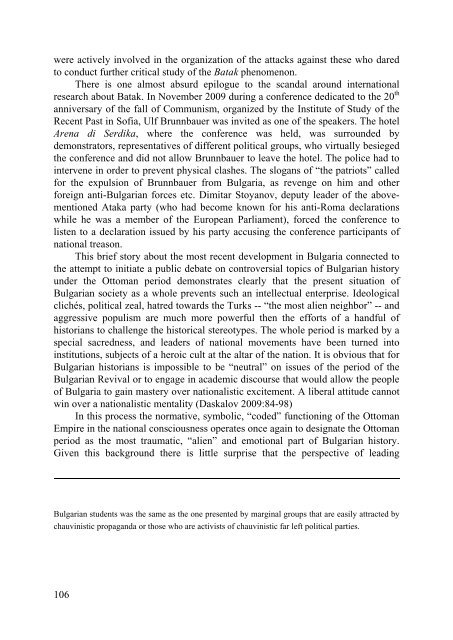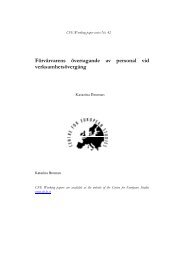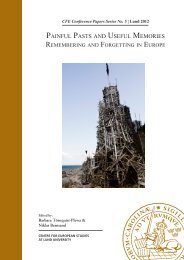MINNE OCH MANIPULATION - Centre for European Studies - Lunds ...
MINNE OCH MANIPULATION - Centre for European Studies - Lunds ...
MINNE OCH MANIPULATION - Centre for European Studies - Lunds ...
Create successful ePaper yourself
Turn your PDF publications into a flip-book with our unique Google optimized e-Paper software.
were actively involved in the organization of the attacks against these who dared<br />
to conduct further critical study of the Batak phenomenon.<br />
There is one almost absurd epilogue to the scandal around international<br />
research about Batak. In November 2009 during a conference dedicated to the 20 th<br />
anniversary of the fall of Communism, organized by the Institute of Study of the<br />
Recent Past in Sofia, Ulf Brunnbauer was invited as one of the speakers. The hotel<br />
Arena di Serdika, where the conference was held, was surrounded by<br />
demonstrators, representatives of different political groups, who virtually besieged<br />
the conference and did not allow Brunnbauer to leave the hotel. The police had to<br />
intervene in order to prevent physical clashes. The slogans of “the patriots” called<br />
<strong>for</strong> the expulsion of Brunnbauer from Bulgaria, as revenge on him and other<br />
<strong>for</strong>eign anti-Bulgarian <strong>for</strong>ces etc. Dimitar Stoyanov, deputy leader of the abovementioned<br />
Ataka party (who had become known <strong>for</strong> his anti-Roma declarations<br />
while he was a member of the <strong>European</strong> Parliament), <strong>for</strong>ced the conference to<br />
listen to a declaration issued by his party accusing the conference participants of<br />
national treason.<br />
This brief story about the most recent development in Bulgaria connected to<br />
the attempt to initiate a public debate on controversial topics of Bulgarian history<br />
under the Ottoman period demonstrates clearly that the present situation of<br />
Bulgarian society as a whole prevents such an intellectual enterprise. Ideological<br />
clichés, political zeal, hatred towards the Turks -- “the most alien neighbor” -- and<br />
aggressive populism are much more powerful then the ef<strong>for</strong>ts of a handful of<br />
historians to challenge the historical stereotypes. The whole period is marked by a<br />
special sacredness, and leaders of national movements have been turned into<br />
institutions, subjects of a heroic cult at the altar of the nation. It is obvious that <strong>for</strong><br />
Bulgarian historians is impossible to be “neutral” on issues of the period of the<br />
Bulgarian Revival or to engage in academic discourse that would allow the people<br />
of Bulgaria to gain mastery over nationalistic excitement. A liberal attitude cannot<br />
win over a nationalistic mentality (Daskalov 2009:84-98)<br />
In this process the normative, symbolic, “coded” functioning of the Ottoman<br />
Empire in the national consciousness operates once again to designate the Ottoman<br />
period as the most traumatic, “alien” and emotional part of Bulgarian history.<br />
Given this background there is little surprise that the perspective of leading<br />
Bulgarian students was the same as the one presented by marginal groups that are easily attracted by<br />
chauvinistic propaganda or those who are activists of chauvinistic far left political parties.<br />
106




